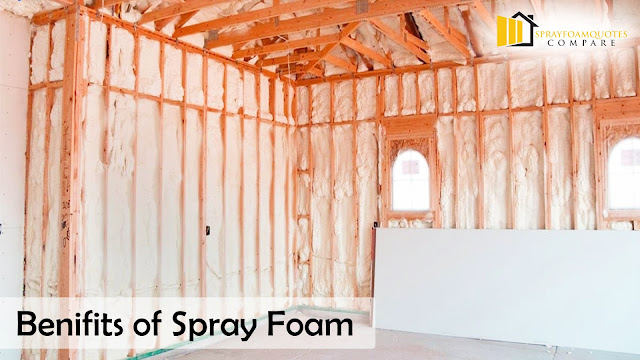Revealing the benefits and ideas of spray foam insulation for your home
Spray foam insulation is a revolutionary solution in the field of home insulation, providing superior energy efficiency. Spray foam insulation involves the application of a liquid foam that expands and hardens, creating a seamless and airtight barrier within walls, ceilings and floors. The primary purpose of insulation in homes is to control temperature, increase comfort, and reduce energy consumption. In this blog, we will explore the types of spray foam insulation, the benefits, considerations before choosing and expert opinion on whether it is a worthy investment for your home.
Types of Spray Foam Insulation
Spray foam insulation is a popular choice for its ability to expand and fill gaps in walls, roofs and other surfaces and provide moisture resistance. There are two main types of spray foam insulation: open-cell and closed-cell. Each type has its own characteristics and is suitable for different applications, which are as follows-
1. Open-Cell Spray Foam:
- Structure: These are not completely encapsulated.
- Expansion: Expands to fill space but remains spongy.
- Density: Lower density than closed-cell foam.
- Insulation value (R-value): Typically lower R-value than closed-cell foam.
- Permeability: Permeable to moisture and vapor.
- Applications: Often used in interior applications such as walls and ceilings. It is effective for sound insulation.
2. Closed-Cell Spray Foam:
- Structure: They are completely encapsulated and filled with gas, which makes them hard.
- Expansion: Expands and hardens, forming a dense and durable insulation layer.
- Density: Higher density than open-cell foam.
- Insulation value (R-value): Higher R-value than open-cell foam, providing better thermal insulation.
- Permeability: Impermeable to moisture and vapor, acts as a moisture barrier.
- Applications: Used in a variety of applications including exterior walls, roofs and areas exposed to moisture. It provides structural strength and acts as a wind and moisture barrier.
Both open-cell and closed-cell spray foam have their advantages and disadvantages, and the choice between them depends on factors such as specific project needs, budget, and local building codes. It is essential to consult professionals to determine the most appropriate type of spray foam insulation for a particular application. Additionally, proper installation is important to achieve optimal performance and energy efficiency.
Benefits of Spray Foam Insulation
A. Energy Efficiency
1.
One of the primary benefits of spray foam insulation is its exceptional thermal resistance, which reduces energy consumption for heating and cooling. Homeowners often experience a significant reduction in their energy bills after installing spray foam insulation.
2.
The energy efficiency provided by spray foam insulation contributes to a lower carbon footprint. By reducing energy use, homeowners actively participate in environmental protection efforts, keeping pace with the growing emphasis on sustainable living.
B. Air Sealing Properties
1.
Unlike traditional insulation materials, spray foam creates a seamless and airtight barrier, reducing air leakage. This feature is important in preventing drafts and maintaining a consistent indoor temperature, enhancing overall comfort.
2.
The air sealing properties of spray foam insulation not only contribute to energy efficiency but also play a role in improving indoor air quality. By preventing the infiltration of allergens and pollutants, the home creates a healthy living environment for its occupants.
C. Long-Term Durability
1. Lifespan
Spray foam insulation is known for its durability and longevity. Once properly installed, it can last for several decades without degradation in performance, providing homeowners with a long-term solution.
2.
Closed-cell spray foam's impermeability to water makes it an excellent choice for moisture-prone areas. This resistance to mold growth adds another layer of protection, ensuring a healthy living space.
Considerations before choosing spray foam insulation
A. Cost Analysis
1.
The initial cost is often higher than traditional insulation materials. Homeowners should analyze its cost considering the initial investment versus the long-term savings and benefits.
2. Long-Term Savings
Despite the higher initial cost, spray foam insulation often provides substantial long-term savings through lower energy bills and minimal maintenance requirements. A comprehensive cost-benefit analysis is necessary to make an informed decision.
B. Application Challenges
1. Professional
Professional installation is important to ensure proper coverage and effectiveness.
2. Potential Health and Safety Concerns
During the application process, the chemicals used in spray foam insulation can emit odors and fumes. It is essential to follow proper ventilation and safety guidelines to minimize any potential health risks during and after installation.
Expert Opinions
A. Insights from Home Improvement Professionals
Home improvement professionals emphasize the unique benefits of spray foam insulation, especially in terms of energy efficiency and long-term durability. Many experts recommend considering it as a strategic investment for the overall well-being of the home.
B. Research Findings and Studies
Various research studies have confirmed the efficacy of spray foam insulation in energy efficiency.
Conclusion
Ultimately, spray foam insulation stands out as a strong contender in the world of home insulation, offering a variety of benefits beyond traditional options. Its ability to provide superior energy efficiency, air sealing properties and long-term durability makes it an attractive option for homeowners seeking a holistic solution. However, the decision to invest should be made by carefully considering factors such as , installation challenges, and potential health concerns. By weighing these considerations against the proven benefits and seeking guidance from experts, homeowners can make an informed decision that is consistent with their goals of a comfortable, energy-efficient, and sustainable living space.
Ultimately, spray foam insulation stands out as a strong contender in the world of home insulation, offering a variety of benefits beyond traditional options. Its ability to provide superior energy efficiency, air sealing properties and long-term durability makes it an attractive option for homeowners and can be a worthy investment for our home. , However, the investment decision should be made with careful consideration of factors such as spray foam insulation cost, installation challenges, and potential health concerns.




Comments
Post a Comment